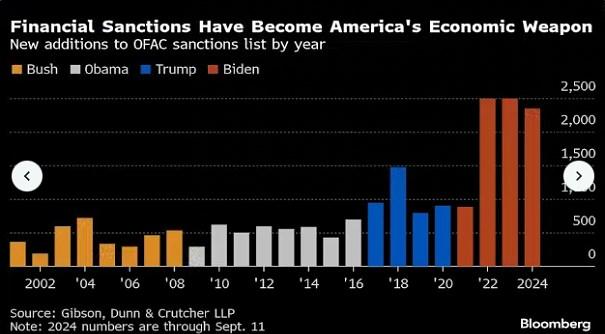Trump's threat to impose secondary tariffs will exacerbate tensions with Latin American countries
On Monday, US President Trump seemed to have invented a new weapon for economic governance, threatening to impose what he called "secondary tariffs" on countries that purchase oil from Venezuela in order to cut off Venezuela's oil trade with other countries.
This threat was issued through Truth Social and subsequently confirmed in an executive order. The threat states that if countries purchase oil and gas from Venezuela (which has already been heavily sanctioned by the United States), they may face a 25% US trade tariff. This move aims to put pressure on Venezuela, as Trump claimed that Venezuela has sent "tens of thousands of high-level criminals and other criminals" to the United States.

Image: Financial sanctions have become an economic weapon of the United States (a new trade weapon invented by Trump as of September 11, 2024)
Trump has been eager to use an increasing number of weapons as a lever to leverage America's economic influence to achieve his foreign and domestic policy goals, and this innovative approach has been added to his weapons list. This idea seems certain to exacerbate tensions with Latin American countries on immigration and foreign policy.
Francisco Monaldi, Director of Latin American Energy Policy at the Baker Institute for Public Policy at Rice University, said, "This is a new concept in economic warfare, and how it is implemented? Of course, it is still unclear
Through this threat, Trump seems to be inventing a combination of tariffs and so-called secondary sanctions, which refer to financial penalties that can be imposed on other countries or individuals doing business with sanctioned entities. Given that Venezuelan oil flows to the United States, Spain, India, and the black market, Trump's target for "secondary tariffs" may be very different.
The first three countries are covered by licenses from Chevron Corp., Repsol SA, and Reliance Industries Ltd.
Monaldi said, "Some countries are the main targets of secondary sanctions because they are essentially a black market for Venezuelan oil. If it weren't for that country, they wouldn't have had to impose secondary tariffs
Trump's executive order grants Secretary of State Rubio the discretion to impose a 25% tariff on countries that directly or indirectly import Venezuelan oil starting from April 2nd. The command does not specify which countries will be subject to secondary tariffs.
Tips:This page came from Internet, which is not standing for FXCUE opinions of this website.
Statement:Contact us if the content violates the law or your rights
